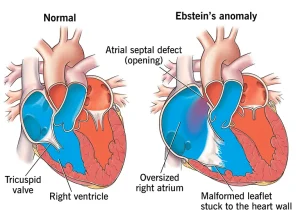Overview
Diagnosis
Ebstein anomaly is diagnosed through a combination of physical examination, imaging tests, and electrocardiographic studies that assess heart structure and function. This rare congenital heart defect affects the tricuspid valve and the right side of the heart.
Tests used to diagnose Ebstein anomaly include:
-
Physical exam: Your healthcare professional may detect abnormal heart sounds such as a murmur, caused by blood leaking through the tricuspid valve.
-
Echocardiogram (Echo): The main test for diagnosis. It uses sound waves to create moving images of the heart, showing how the tricuspid valve is formed and how blood flows through it.
-
Electrocardiogram (ECG or EKG): This test records the heart’s electrical activity and can detect irregular heart rhythms, which are common in people with Ebstein anomaly.
-
Chest X-ray: Helps evaluate the size and shape of the heart and detect fluid buildup in the lungs.
-
Cardiac MRI: Provides detailed images of the heart’s structure and helps measure how well the right side of the heart is functioning.
-
Pulse oximetry: Measures oxygen levels in the blood, which can be lower in people with this condition.
-
Cardiac catheterization: In some cases, this test is used to measure pressures inside the heart and assess how well the heart is pumping.
Treatment
Treatment for Ebstein anomaly depends on the severity of symptoms, the extent of valve malfunction, and whether the heart rhythm is affected. Some people may not need treatment for years, while others require early intervention.
-
Observation and monitoring: Mild cases with few or no symptoms may only need regular checkups with a cardiologist, including periodic echocardiograms and ECGs to monitor heart function.
-
Medications:
-
Diuretics help remove excess fluid that can accumulate due to heart failure.
-
Anti-arrhythmic drugs help control irregular heart rhythms.
-
Oxygen therapy may be prescribed in cases with low oxygen levels.
-
-
Cardiac ablation: If you have recurring abnormal heart rhythms, a procedure called catheter ablation may be used to correct electrical conduction pathways in the heart.
-
Surgery: For moderate to severe cases, surgery may be needed to repair or replace the tricuspid valve or correct other associated heart defects.
-
Tricuspid valve repair: The surgeon reshapes or repositions the valve to allow better function.
-
Tricuspid valve replacement: In more severe cases, the damaged valve is replaced with a mechanical or biological valve.
-
Atrial septal defect (ASD) closure: If there’s a hole between the heart’s upper chambers, it may be closed during surgery.
-
-
Heart transplantation: In rare, severe cases where the heart is significantly weakened and other treatments are ineffective, a heart transplant may be considered.
Ongoing care
People with Ebstein anomaly often need lifelong follow-up with a cardiologist who specializes in congenital heart disease. Regular monitoring helps detect changes in heart function and manage complications such as arrhythmias or heart failure early.
Women with this condition who wish to become pregnant should consult a cardiologist before conception, as pregnancy can strain the heart and may require special management.
With appropriate treatment and ongoing care, many individuals with Ebstein anomaly can lead active, fulfilling lives.
Advertisement

